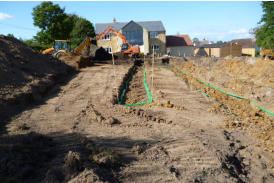
Ground Source Heat Pumps
How it works
Ground source heat pumps use pipes buried in the garden to harness natural heat from the ground. It does this by pumping water through the pipes, this heat can then be used to heat radiators, underfloor or hot water in your home. The pump needs electricity to run, but it uses less than the heat it will produce. It uses the heat from the ground, rather than burning a fuel, which will then generate heat.
The Ground Source Heat Pump contains a mixture of anti-freeze & water, which is pumped around the ground loop of pipe. The heat from the ground will then be absorbed into the water mixture, which then travels to a heat exchanger.
Even if the air temperature is low, the temperature underground tends to stay at a constant temperature; this means the heat pump can be used all year round.
The installation would normally see the pipes / loop laid flat or it can be coiled in trenches which are around two meters deep. However, if you are limited for space in your garden you could look to install a vertical loop, which goes down into the ground, usually to a depth of up to 100 meters for the average home.
The Ground Source Heat pumps do have a carbon footprint, as they need electricity to run, but the heat they extract from the ground around it is constantly being renewed naturally.
Benefits of ground source heat pumps
- You could enjoy lower fuel bills, especially if you are replacing storage heaters & electrical heating
- The UK government’s Renewable Heat Incentive means potential income for you
- If you are replacing a fuel that leaves a big carbon foot print you will lower your home carbon emissions, making your home more environmentally friendly
- In rural areas like the ones surrounding Otter’s head office in Taunton Somerset, fuel deliveries are often needed; the heat pump would eliminate this necessity.
- Will heat your home & your water
- Maintenance is kept to a minimum. An annual service is required to keep the heat pump in the best condition. This is a service that Otter South West offers.
The Pros & Cons of a Ground Source Heat Pump
Pros
- Ground Source Heat Pumps can provide heating and hot water.
- Ground source heat pumps generate less CO2 than conventional heating systems.
- They require little maintenance.
- You need to use electricity to power the pump, but for every unit you use you get between 2 & 4 units back.
Cons
- Installing a ground source heat pump is not cheap.
- Groundwork’s would be required to dig the trenches & this can be disruptive.
- Although not always, planning permission may be required.
- You still need to use electricity to work the pump; this means the Ground source heat pump wouldn’t be considered completely zero-carbon.




